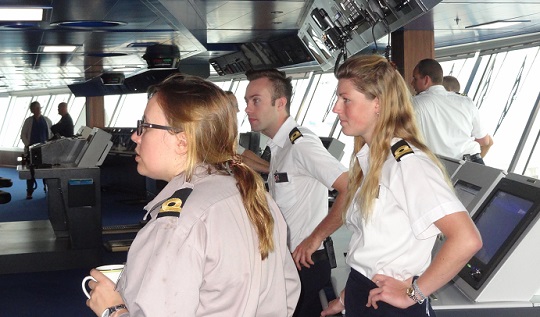
Until companies are willing to invest in a decent standard, you will have trouble attracting cadets, as conditions are far worse than in the 1970s when I did my cadetship.
We got £110 per month on average, which in those days was equivalent to between 300 and 400 beers, depending where in Aberdeen you had a drink. That was pure pocket money as all our accommodation was paid for. No halls of residence but B&B plus dinner, though all accommodation had to be approved by the college and be thoroughly vetted.
Bus fares to and from college, meals, an allowance for laundry if no facilities in accommodation, warrants home each break period and often in between (companies reasoning that if at home we were under the watchful eye of our parents). Uniform was white shirt, black trousers and a blazer with company badge and a company tie.
Obviously our behaviour was monitored, but one lecturer told us we were young and it would be the last chance to kick up our heels before we went to sea so make use of it long as our studies didn't suffer. We were also told if we over-indulged the night before, we should turn up and less would be said than if we didn't turn up. Drugs were a no-no then as now, but drinking was tolerated as long as it didn't affect our studies and we didn't miss class.
Now cadets pay for accommodation, food and many other costs that we got as perks along with rigorous testing for drugs and alcohol. The remaining money after all these costs is small compared to my day and we wonder why there is a shortage of cadets. Remember back then you could buy a decent wee car with a year's MOT for £100. Stop all this Big Brother testing for alcohol and only do drug tests as part of a medical or when there is a reason to suspect illicit use. Let young people be young people.
Companies are training their next generation of professional seafarers, so should treat them as an asset, not a necessary evil. At university or shore working, you can have the odd sick day or go to the dentist, family wedding or other occasion, but once at sea your life is governed by trip rota and length, and all of normal life is suspended while on a vessel. Yes we now have internet (if you're lucky) and can keep in touch with family, but it's not the same as being there.
If we want to attract good people to this line of work, we need not only a decent package while they are training but good conditions when at sea, especially on first trips – and we shouldn't have cadets on ships with next to no English speakers. It should be compulsory for UK-flag ships or UK-based companies to employ cadets and give them a decent living standard when onboard, no Hungry Hogarths. I have heard from the few cadets that I have sailed with recently about persons from their courses who ended up on ships with no native English speakers and felt lonely, hence they quit.
I certainly would not be coming to sea if I was just starting again, based on what I hear from the cadets.
Membership no 154969
More letters
Insulin-treated diabetics: help shape your seafaring future
We’re looking for insulin-dependent seafarers working at sea with a valid ENG1 or ML5 certificate to take part in a new study that could mean fewer restrictions on this group in future.
It’s never right to attack civilian seafarers
I was saddened to see the footage of the attack by Ukraine on the two tankers in the Black Sea on 29 November. My heart goes out to the crew and officers who are, in my mind, not combatants in the Russia/Ukraine war.
There's no crisis in the yacht sector
I read Rob Coston's interview with yacht sector recruitment agent Max Lee on your website and found it sensationalist. In my opinion, it incorrectly described the situation regarding safety in yachting as a 'crisis'.
